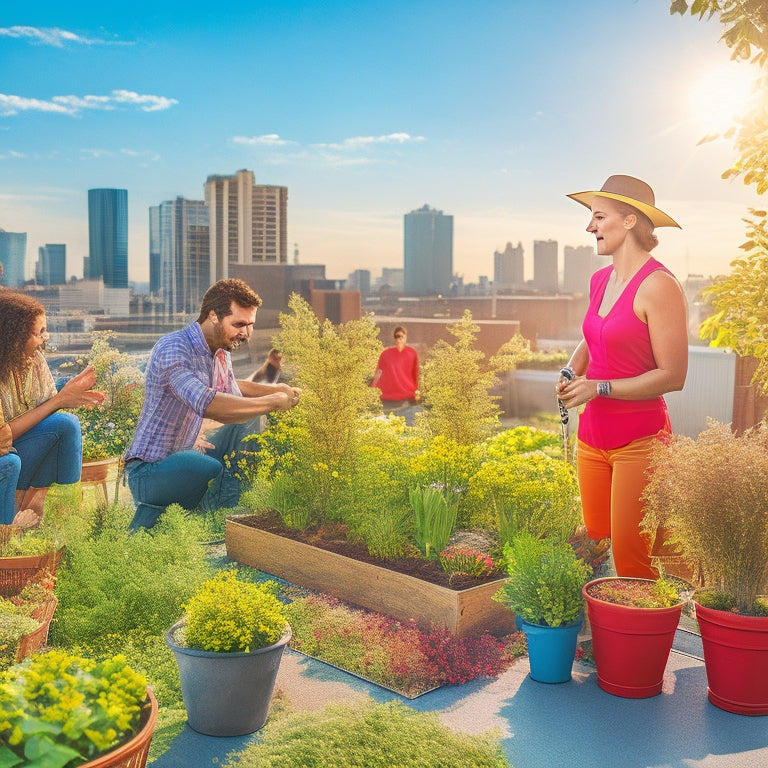
3 Urban Farming Workshops for Solar-Powered Neighborhoods
Share
You're about to change your solar-powered neighborhood into a thriving agricultural hub with the power of community-driven urban farming, and these three workshops are the perfect starting point. First, "Empowering Sustainable Urban Agriculture" focuses on community engagement, resource sharing, and solar-powered fast charging hubs to enhance sustainability. Next, "Green Thumb Training for Neighbors" teaches soil preparation, plant care, and community gardening strategies to create productive backyard gardens. Finally, "Efficient Farming Methods Demonstrated" showcases innovative techniques like hydroponics, vertical gardening, and crop rotation to optimize yields. By exploring these workshops, you'll access the full potential of urban farming in your neighborhood.
Key Takeaways
- Solar-powered fast charging hubs enhance the sustainability of urban agriculture practices, supporting eco-friendly farming methods.
- Collaborative workshops facilitate knowledge sharing and resource exchange among neighbors, promoting community-driven urban agriculture.
- Hands-on training sessions focus on efficient farming methods, including hydroponics, vertical gardening, and companion planting.
- Participants learn best practices for soil preparation, plant care, and pest management, ensuring productive backyard gardens.
- Interactive forums and demonstrations showcase innovative techniques to optimize crop production and reduce waste in urban settings.
Empowering Sustainable Urban Agriculture
How can urban agriculture be enabled to become a sustainable solution for our cities?
You can play a key role in strengthening sustainable urban agriculture by nurturing community engagement and resource sharing. This involves collaborating with your neighbors to share knowledge, tools, and proficiency.
By doing so, you'll not only reduce waste and increase food production but also build stronger, more resilient communities.
Additionally, incorporating solar-powered fast charging hubs and renewable energy sources can further enhance the sustainability of urban agriculture.
You can organize workshops, webinars, or online forums to facilitate knowledge sharing and skill-building.
Additionally, consider creating a cooperative or community garden where members can share resources and work together to maintain a thriving agricultural space.
Green Thumb Training for Neighbors
Your backyard can be a hub of urban agricultural activity, and with the right training, you and your neighbors can turn it into a flourishing oasis.
By participating in green thumb training, you'll learn the essential skills to maintain a successful community garden. This thorough training will cover:
- Soil preparation and maintenance: Learn how to create a nutrient-rich soil that will support healthy plant growth.
Regular maintenance, including cleaning and inspecting connections, is crucial for optimizing performance and guaranteeing longevity, as seen in solar panel maintenance. By applying similar principles to soil care, you can prevent issues before they escalate.
-
Plant care and management: Uncover the best practices for watering, pruning, and pest management to make sure your plants thrive.
-
Community gardening strategies: Understand how to work collaboratively with your neighbors to design and maintain a shared garden space.
With this training, you'll be equipped to convert your backyard into a lively oasis, providing fresh produce and a sense of community satisfaction.
Efficient Farming Methods Demonstrated
You'll have the opportunity to witness efficient farming methods in action during our hands-on demonstrations, where experts will showcase innovative techniques to maximize yields while minimizing resources. You'll learn how to optimize your crops using hydroponic techniques, which reduce water consumption by up to 90%. Our vertical gardening demonstrations will show you how to make the most of your space, growing more in less area.
| Method | Advantages | Benefits |
|---|---|---|
| Hydroponics | Reduced water consumption, increased crop yields | Water conservation, increased food production |
| Vertical Gardening | Space efficiency, reduced land use | Increased crop yields, reduced urban sprawl |
| Companion Planting | Natural pest control, improved growth | Reduced chemical use, increased biodiversity |
| Crop Rotation | Soil health maintenance, reduced erosion | Improved soil quality, reduced environmental impact |
Frequently Asked Questions
How Do I Maintain Soil Quality in an Urban Farming Setup?
You'll maintain soil quality by implementing composting techniques, like vermicomposting or hot composting, and regularly conducting soil testing to monitor pH levels, nutrient content, and microbial activity, ensuring a balanced and thriving urban farm ecosystem.
Are Solar-Powered Farms Suitable for Small Residential Areas?
You'll be surprised to know that 15% of global food is already grown in urban areas! When it comes to small residential areas, solar-powered farms can thrive with community engagement and sustainable practices, allowing you to enjoy fresh produce while reducing your carbon footprint.
Can I Grow Fruits and Vegetables on My Rooftop?
You can definitely grow fruits and vegetables on your rooftop by adopting rooftop gardening and container planting methods, which allow for creative space utilization and ideal sunlight exposure, giving you the freedom to harvest fresh produce right at home.
How Do I Ensure Consistent Water Supply for Urban Farming?
You'll want to guarantee a consistent water supply by implementing efficient systems like drip irrigation, which reduces waste, and rainwater harvesting, which collects and stores precious water for your urban farm, giving you freedom from utility dependence.
Are Urban Farming Workshops Open to People Without Prior Experience?
You're not a green thumb, but you're curious about urban farming? No worries! Most workshops welcome beginners, offering beginner resources and encouraging community involvement, so you can learn and grow alongside like-minded individuals.
Related Posts
-

7 Best Cool Roof Rebates for Energy-Savvy Homeowners
You're an energy-savvy homeowner looking to install a cool roof, and you're wondering which rebates can help you save...
-

7 Best EV Battery Health Trackers for Homeowners
You can maximize your electric vehicle's performance and lifespan by leveraging advanced battery health trackers that...
-

10 Powerful Electric Mowers for Expansive Lawns
You're moving away from gas-powered mowers and exploring electric options for your expansive lawn. You'll find that h...


